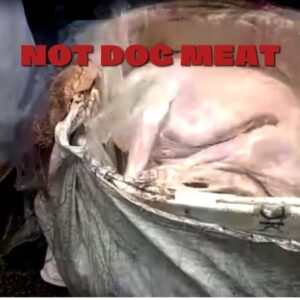In a recent incident, allegations of dog meat being supplied to local hotels in Bengaluru sparked a heated controversy. The incident, which unfolded at the Majestic Railway Station, has since been clarified by food safety authorities, revealing a complex web of issues related to meat supply, demand, and regulation in the bustling metropolis.
On a Friday evening, Hindutva activist Puneet Kerehalli and others staged a protest near the Majestic Railway Station in Bengaluru. They alleged that dog meat, along with mutton, was being transported from Rajasthan to Bengaluru for sale in local establishments. This accusation quickly gained traction, causing widespread concern among residents and meat consumers in the city.

The protest led to a confrontation with law enforcement, resulting in the arrest of Kerehalli and his associates. They were charged under Section 132 of the BNS Act for obstructing police officers on duty and Section 351 (2) for disturbing the peace. The incident prompted immediate action from local authorities and food safety officials.
In response to the allegations, a team comprising police officers and officials from the Karnataka Food Safety and Standards Authority (FSSA) conducted a thorough inspection at the railway station. During their investigation, they discovered 90 parcels containing animal meat that had arrived by train from Rajasthan and were being loaded into a vehicle on the station’s outer premises.
K Srinivas, the commissioner of food safety, provided a crucial clarification that dispelled the initial allegations. He stated, “The meat, at the outset, was not of a dog but is of a special breed of goat, Sirohi, which is largely found in Rajasthan and Kutch-Bhuj areas of Gujarat.” Srinivas explained that the Sirohi goat’s physical characteristics, including an elongated tail and spots, could easily lead to confusion with dog meat.
Sirohi Goat
The incident brought to light a significant issue facing Karnataka’s meat market – a shortage of chevon (goat meat). Prof B L Chidananda, former professor of animal sciences at Gandhi Krishi Vigyan Kendra (GKVK), shed light on this problem. He explained that unlike popular sheep varieties, Karnataka does not have its own goat breeds, resulting in a 25% to 30% shortfall of chevon in Bengaluru and other parts of the state.
This scarcity is particularly noteworthy given that Bengaluru, along with other districts in Karnataka, is one of the largest consumers of meat in the region. To bridge this gap and maintain affordability, traders have resorted to sourcing cheaper varieties of chevon from other states with large-scale production.
The Karnataka government responded promptly to the controversy. The Karnataka Food Safety and Standards Authority (FSSA) Commissionerate issued a statement confirming that samples of the seized meat had been sent to a food laboratory for analysis. The authorities assured the public that further action would be taken based on the results of these tests.
The Commissionerate also stated that they were collecting detailed information about the FSSAI licenses of both the senders and recipients of the meat parcels. They promised to initiate legal action if any discrepancies were found in compliance with regulations.
The incident has stirred significant concern among Bengaluru residents and meat consumers. Former Infosys CFO Mohandas Pai expressed his shock on social media, calling for government action. The controversy has highlighted the need for greater transparency and regulation in the meat supply chain, as well as the importance of addressing the underlying issues of meat scarcity and affordability in the region.
This incident has brought attention to the complexities of the meat supply and demand dynamics in Bengaluru. It underscores the lengths to which traders go to meet consumer needs while navigating issues of scarcity and affordability. The situation calls for a more comprehensive approach to addressing the chevon shortage in Karnataka, potentially through initiatives to develop local goat breeds or improve supply chain efficiency.



















































































